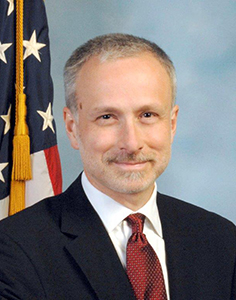Neustar, Inc. is an American technology company that provides real-time information and analytics for risk, digital performance, defense, telecommunications, entertainment, and marketing industries, and also provides clearinghouse and directory services to the global communications and Internet industries. Neustar was the domain name registry for a number of top-level domains, including .biz, .us, .co, .nyc, and .in until the sale of the division to GoDaddy in 2020.

Akamai Technologies, Inc. is an American content delivery network (CDN), cybersecurity, and cloud service company, providing web and Internet security services. The company operates a network of servers worldwide and rents the capacity of the servers to customers wanting to increase the efficiency of their websites by using Akamai owned servers located near the user. When a user navigates to the URL of an Akamai customer, their browser is directed by Akamai's domain name system to a proximal edge server that can serve the requested content. Akamai's mapping system assigns each user to a proximal edge server using sophisticated algorithms such as stable matching and consistent hashing, enabling more reliable and faster web downloads. Further, Akamai implements DDoS mitigation and other security services in its edge server platform.

Trend Micro Inc. is a multinational cyber security software company with global headquarters in Tokyo, Japan and in Dallas/Fort Worth Metroplex, United States. The company has globally dispersed R&D in 16 locations across every continent excluding Antarctica. The company develops enterprise security software for servers, containers, & cloud computing environments, networks, and end points. Its cloud and virtualization security products provide automated security for customers of VMware, Amazon AWS, Microsoft Azure, and Google Cloud Platform.

James Andrew Baker is a former American government official at the Department of Justice who served as general counsel for the Federal Bureau of Investigation (FBI) and later served as deputy general counsel at Twitter, Inc. before being fired by Elon Musk in December 2022.
Perkins Coie is an American multinational law firm headquartered in Seattle, Washington. Founded in 1912, it is recognized as an Am Law 50 firm. It is the largest law firm headquartered in the Pacific Northwest and has 20 offices across the United States and Asia. The firm provides corporate, commercial litigation, intellectual property, and regulatory legal advice to a broad range of clients, including prominent technology companies like Google, Twitter, Intel, Facebook, and Amazon. In addition to its corporate representation, the firm has represented political clients. The firm is known for its pro bono work.
A supply chain attack is a cyber-attack that seeks to damage an organization by targeting less secure elements in the supply chain. A supply chain attack can occur in any industry, from the financial sector, oil industry, to a government sector. A supply chain attack can happen in software or hardware. Cybercriminals typically tamper with the manufacturing or distribution of a product by installing malware or hardware-based spying components. Symantec's 2019 Internet Security Threat Report states that supply chain attacks increased by 78 percent in 2018.

The United States has often accused the government of China of attempting unlawfully to acquire U.S. military technology and classified information as well as trade secrets of U.S. companies in order to support China's long-term military and commercial development. Chinese government agencies and affiliated personnel have been accused of using a number of methods to obtain U.S. technology, including espionage, exploitation of commercial entities, and a network of scientific, academic and business contacts. Prominent espionage cases include Larry Wu-tai Chin, Katrina Leung, Gwo-Bao Min, Chi Mak and Peter Lee. The Ministry of State Security (MSS) maintains a bureau dedicated to espionage against the United States, the United States Bureau.
Cozy Bear, classified by the United States federal government as advanced persistent threat APT29, is a Russian hacker group believed to be associated with one or more intelligence agencies of Russia. The Dutch General Intelligence and Security Service (AIVD) deduced from security camera footage that it is led by the Russian Foreign Intelligence Service (SVR); this view is shared by the United States. Cybersecurity firm CrowdStrike also previously suggested that it may be associated with either the Russian Federal Security Service (FSB) or SVR. The group has been given various nicknames by other cybersecurity firms, including CozyCar, CozyDuke, Dark Halo, The Dukes, NOBELIUM, Office Monkeys, StellarParticle, UNC2452, and YTTRIUM.
Lazarus Group is a cybercrime group made up of an unknown number of individuals run by the government of North Korea. While not much is known about the Lazarus Group, researchers have attributed many cyberattacks to them between 2010 and 2021. Originally a criminal group, the group has now been designated as an advanced persistent threat due to intended nature, threat, and wide array of methods used when conducting an operation. Names given by cybersecurity organizations include Hidden Cobra and Zinc.

The Democratic National Committee cyber attacks took place in 2015 and 2016, in which two groups of Russian computer hackers infiltrated the Democratic National Committee (DNC) computer network, leading to a data breach. Cybersecurity experts, as well as the U.S. government, determined that the cyberespionage was the work of Russian intelligence agencies.

"Guccifer 2.0" is a persona which claimed to be the hacker(s) who gained unauthorized access to the Democratic National Committee (DNC) computer network and then leaked its documents to the media, the website WikiLeaks, and a conference event. Some of the documents "Guccifer 2.0" released to the media appear to be forgeries cobbled together from public information and previous hacks, which had been mixed with disinformation. According to indictments in February 2018, the persona is operated by Russian military intelligence agency GRU. On July 13, 2018, Special Counsel Robert Mueller indicted 12 GRU agents for allegedly perpetrating the cyberattacks.

DCLeaks was a website that was established in June 2016. It was responsible for publishing leaks of emails belonging to multiple prominent figures in the United States government and military. Cybersecurity research firms determined the site is a front for the Russian cyber-espionage group Fancy Bear. On July 13, 2018, an indictment was made against 12 Russian GRU military officers; it alleged that DCLeaks is part of a Russian military operation to interfere in the 2016 U.S. presidential election.

The Cybersecurity and Infrastructure Security Agency (CISA) is an agency of the United States Department of Homeland Security (DHS) that is responsible for strengthening cybersecurity and infrastructure protection across all levels of government, coordinating cybersecurity programs with U.S. states, and improving the government's cybersecurity protections against private and nation-state hackers. Its activities are a continuation of the National Protection and Programs Directorate (NPPD), and was established by the Cybersecurity and Infrastructure Security Agency Act of 2018.
Charming Kitten is an Iranian government cyberwarfare group, described by several companies and government officials as an advanced persistent threat.

U.S. government investigations into Russian interference in the 2016 elections, and the links between Russian intelligence and Trump associates, started with the FBI's Crossfire Hurricane investigation, and continued with the "Mueller investigation" which was established after President Donald Trump fired the director of the FBI James Comey,. The Mueller investigation concluded that Russian interference was "sweeping and systematic" and "violated U.S. criminal law", and indicted Russian citizens and Russian organizations. The investigation "identified numerous links between the Russian government and the Trump campaign". The investigation resulted in charges against 34 individuals and 3 companies, 8 guilty pleas, and a conviction at trial. However it concluded that though the Trump campaign welcomed the Russian activities and expected to benefit from them, there was insufficient evidence to bring any conspiracy or coordination charges against Trump or his associates, and that they were prevented from reaching a conclusion on whether Trump had obstructed justice by a Justice Department guideline prohibiting the federal indictment of a sitting president.

In 2020, a major cyberattack suspected to have been committed by a group backed by the Russian government penetrated thousands of organizations globally including multiple parts of the United States federal government, leading to a series of data breaches. The cyberattack and data breach were reported to be among the worst cyber-espionage incidents ever suffered by the U.S., due to the sensitivity and high profile of the targets and the long duration in which the hackers had access. Within days of its discovery, at least 200 organizations around the world had been reported to be affected by the attack, and some of these may also have suffered data breaches. Affected organizations worldwide included NATO, the U.K. government, the European Parliament, Microsoft and others.
Michael A. Sussmann is an American former federal prosecutor and a former partner at the law firm Perkins Coie, who focused on privacy and cybersecurity law. Sussmann represented the Democratic National Committee (DNC) and retained CrowdStrike to examine its servers after two Russian hacker groups penetrated DNC networks and stole information during the 2016 U.S. elections.
Doug Madory is an American Internet routing infrastructure expert, who specializes in analyzing Internet Border Gateway Protocol (BGP) routing data to diagnose Internet routing disruptions, such as those caused by communications fiber cable cuts, routing equipment failures, and governmental censorship. His academic background is in computer engineering, and he was a signals specialist in the U.S. Air Force, before arriving at his present specialty, which has occupied his professional career.

The Durham special counsel investigation began in 2019 when the U.S. Justice Department designated federal prosecutor John Durham to review the origins of an FBI investigation into Russian interference in the 2016 United States elections. Durham was given authority to examine the government's collection of intelligence about interactions between the 2016 presidential campaign of Donald Trump and Russians, and to review government documents and request voluntary witness statements. In December 2020, Attorney General William Barr announced that he had elevated Durham's status and authority by appointing him as a special counsel, allowing him to continue the investigation after the end of the Trump presidency.








